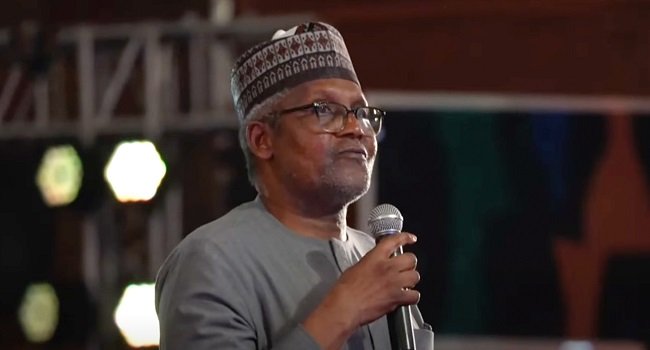AFRICA’s richest man, Alhaji Aliko Dangote, has cast serious doubt on the future of Nigeria’s government-owned refineries, declaring that despite over $18 billion spent on their rehabilitation over the years, the facilities may never return to optimal production.
Dangote, who spoke in Lagos on Thursday while receiving a delegation from the Global CEO Africa programme of the Lagos Business School, said it was unlikely that the Port Harcourt, Warri, and Kaduna refineries, operated by the Nigerian National Petroleum Company Limited (NNPCL), would ever function effectively again.
According to the billionaire, years of wasteful spending and outdated infrastructure have rendered the refineries financial black holes, despite repeated promises by various administrations to revive them.
“They have spent about $18 billion on those refineries, and they are still not working,” Dangote stated bluntly.
“And I don’t think, and I doubt very much, if they will work again.”
During the tour of his 650,000 barrels-per-day refinery in Lekki, now seen as the likely solution to Nigeria’s fuel import woes, Dangote pointed out a stark contrast in efficiency and product focus between his plant and those owned by the state.
“The refineries we previously bought which were owned by the government only produced about 22 per cent PMS (petrol),” he explained.
“In contrast, the Dangote refinery today allocates over 50 per cent of its output to petrol, meeting a crucial domestic demand.”
Dangote recounted how his company had acquired the refineries in January 2007, during the closing days of President Olusegun Obasanjo’s administration.
However, the sale was reversed months later after Obasanjo left office, under pressure from the incoming President Umaru Musa Yar’Adua, who was told by NNPC executives that the refineries had been sold cheaply as a “parting gift.”
“They convinced Yar’Adua that they could fix the refineries. But that never happened. And today, here we are — billions gone and still no fuel,” Dangote lamented.
Drawing a vivid analogy, Dangote said the effort to rehabilitate the government’s refineries was akin to installing a modern engine in a 40-year-old car.
“Even if you replace the engine, the body will not be able to take the shock of that new technology,” he said, emphasising the obsolescence of the facilities.
This perspective echoes sentiments previously shared by former President Obasanjo, who in multiple public statements over the past two years has expressed deep frustration at the condition and mismanagement of the refineries.
Obasanjo had earlier revealed that he advised his successor not to cancel the sale of the refineries, warning that the NNPC lacked the capacity to manage them.
“NNPC knew they could not do it, but they wanted to continue the corruption and inefficiency,” Obasanjo said during a 2023 interview.
“Shell refused to run the refineries. They told me it was not commercially viable. But people in NNPC claimed otherwise.”
He added that the $750 million paid by Dangote and his consortium to acquire the refineries was a realistic valuation, not a “gift,” and that future attempts to sell them might fetch only a fraction of that price as scrap.
“When you want to sell them again, you won’t get even $200 million,” Obasanjo warned.
Public frustration with the refineries reached new highs after the Port Harcourt refinery, declared “partially operational” by the NNPCL in late 2024, was quietly shut down again just six months later. The Warri refinery, reopened in December 2024, also ceased operations within a month.
According to industry figures:
$1.4 billion was approved for the Port Harcourt refinery overhaul in 2021.
$897 million was earmarked for the Warri refinery.
$586 million was allocated to Kaduna refinery.
Over N100 billion was spent on “refinery rehabilitation” in 2021 alone.
Between 2013 and 2017, more than $396 million was spent on Turnaround Maintenance, with little to show for it.
Yet, none of the refineries are producing fuel today despite enormous spending.
The recent failures have prompted renewed calls for the government to privatise the refineries outright or scrap them altogether.
The Manufacturers Association of Nigeria (MAN) has repeatedly described the refineries as a drain on the economy, arguing that they are a fiscal liability in a time of tight budgets and growing debt.
Some industry players have advised that the refineries be sold off as scrap, with proceeds reinvested into modular refineries, which are smaller, quicker to build, and cheaper to maintain.
“These facilities are no longer assets; they are liabilities,” said one refinery consultant.
“Let’s be honest: the country doesn’t need more announcements. It needs fuel.”
Despite the gravity of the issues raised, the NNPCL has so far made no public statement in response to Dangote’s or Obasanjo’s comments.
The company currently does not have a confirmed spokesperson, and multiple attempts by this newspaper to reach contacts listed on its website went unanswered.
As Dangote’s private refinery ramps up production and begins export shipments, many Nigerians are watching closely to see if the project can succeed where decades of state control have failed.
Meanwhile, the NNPC refineries, once symbols of national self-reliance are rapidly turning into monuments of waste, corruption, and lost potential.
“The real question now,” one analyst noted, “is not how to fix the refineries, but how to move on from them.”







